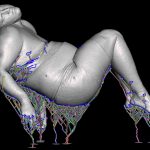All-Inclusive Cyborg Talks
The All-Inclusive Cyborg Talks are presented in the public program of ROBOT LOVE. The lectures and debates, looking at the phenomenon of cyborgism from different perspectives, deepen and sharpen the theme.
The talks take place during the Dutch Design Week 2018.
Transparency vs Privacy
Chair: Daniëlle Arets
Data ethics is becoming increasingly important in fashion and wearables design. Yet the big picture appears to be shadowy when it comes to big data and surveillance capitalism. Large companies and governments have opportunities to circumvent new laws or to look for boundaries. Responding to the demand for transparency with loss of privacy as a result has unevenly burdened the (ex)citizen. Critically approaching technology bubbles remains necessary to generate awareness and seek protection together.
Photo: Disnovation, Predictive Art Bot
Read more about the chair:
Daniëlle Arets
Daniëlle Arets is associate Reader of the readership Journalism & Responsible Innovation at Fontys school of journalism & readership Strategic Creativity at Design Academy Eindhoven. Daniëlle is shaping the future of journalism through design research, investigating technology trends and prototype future concepts for content delivery. Her work is informed by a passion for cultural and technological trends, employing human-dignified means for innovation.
Read more about the speakers:
Mirko Tobias Schaefer
Data collection captures our personal life and enables the analysis of our behavior and the prediction of future events. Increasingly data and models become part of decision making processes from channeling traffic over approving loans, detecting social welfare fraud or selecting job applicants to the sentencing of convicts. As these ‘black boxes’ affect personal livelihoods or issues of public interest, robust frameworks for responsible data practices are needed as well as the possibility to enforce and audit them. Data and algorithms must be recognized as a matter of public interest, as a subject for political debate and deliberation. With reference to our own process of evaluating data projects (Data Ethics Decision Aid by Utrecht data School), his contribution inquires possibilities of establishing awareness for data ethics, and checks and balances for data projects.
Mirko Tobias Schäfer is Associate Professor for New Media & Digital Culture at Utrecht University and the project leader of the Utrecht Data School. His research interest revolves around the socio-political impact of (media) technology. His publications cover user participation, datafication, and communication in social media. He is co-editor and co-author of the volume Digital Material. Tracing New Media in Everyday Life and Technology (Amsterdam University Press, 2009). He is author of the book Bastard Culture! How User Participation Transforms Cultural Production (Amsterdam University Press 2011). Recently he edited (together with Karin van Es) the volume The Datafied Society. Studying Culture through Data (Amsterdam University Press 2017).
Disnovation
Through the hacking of surveillance techniques, machine learning, and big-data analytics, DISNOVATION.ORG’s trilogy of internet bots is uncovering and repurposing some of the influential and opaque operating systems of our online environment. Started in 2012 with The Pirate Cinema, followed by Predictive Art Bot, and continued with Computational Propaganda, this series explores black box technologies and the algorithmic governance of our aspirations, decisions, and political views. These three artworks aim to reveal emergent algorithmic imaginaries, expose the inner workings of these systems, and stimulate critical debate.
DISNOVATION.ORG is a working group based in Paris, initiated by Nicolas Maigret and Maria Roszkowska. At the crossroads between contemporary art, research and hacking, the collective develops situations of disturbance, speculation, and debate, challenging the dominant ideology of technological innovation (from techno-solutionism to techno-escapism) and stimulating the emergence of alternative narratives. They recently edited The Pirate Book, an anthology on media piracy. Their research includes artworks, curation and publications.
Leanne Wijnsma
Data leak? That smells phishy. Data leaks and identity theft are a growing problem. By accepting Terms and Conditions without reading them or by connecting to a public wifi network, we are constantly leaving behind digital traces with the risk of personal information falling into the wrong hands. Smell of Data is making data leaks tangible by adding a scent to it. A new scent has been developed that (just like it does with gas) functions as an instinctive warning mechanism. By helping internet users recognizing and fixing data leaks, the Smell of Data creates awareness of the risks around data leakage.
Leanne Wijnsma’s work uses design as a tool for research and experience in an urgency to reflect on the human condition. She investigates the relationship between freedom and technology through smell design and subterranean explorations. Through senses and sensors, her immersive designs trigger instinctual responses that create an inherent understanding of complex or hidden infrastructures.
Marcel Aarts
As users of digital services, we leave all kinds of digital traces throughout the day, often without our being aware of it. “Data is the new oil” is the new mantra of companies, institutions and governments. Many new companies are solely focused on data. In exchange for all data that we leave or share, we are offered all kinds of services, sometimes valuable, useful or entertaining, sometimes irritating. Why is data so valuable for companies and what do they do with it? And what do we, as citizens, users and consumers, achieve?
Marcel Aarts is an engineer / manager / entrepreneur who started his career in the year that the modern internet was conceived and the first laptops and digital mobile phones appeared on the market. He was responsible for the introduction of the first broadband connections and the development of digital networks throughout Europe and beyond. He currently supports companies in the development of new digital services and is a mentor for startups at Yes! Delft and ImpactHUB.
Location
Robot Love Expo Experience
Campina Milkfactory
At: Kanaaldijk-Zuid/Hugo van der Goeslaan
5613 LE Eindhoven
Date
Wednesday, October 24, 2018
10.00 ’till 11.30 a.m.
Doors open: 9.30




